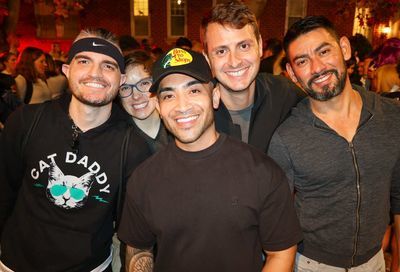Report: LGBTQ students in Oregon experiencing rise in violence and harassment
The University of Oregon found that LGBTQ students experience twice as much bullying as their peers

A new report has found that bullying and violence against LGBTQ students is rising in Oregon schools.
The University of Oregon and the Oregon Safe Schools and Communities Coalition released their “State of Safe Schools Report,” which found LGBTQ students receive twice as much verbal, physical, psychological and sexual violence as their straight peers in Oregon schools.
The survey was conducted across 600 schools and 27,000 students and found that LGBTQ students reported feeling unsafe due to bullying, violence, sexual assault and suicide ideation. LGBTQ students are also three times more likely to be absent from school due to fear of violence, assault, or other factors.
“In 2017, bias-based bullying, violent harassment, sexual assault and fear-based absences were at alarming rates among our LGBTQ youth,” said Julie Heffernan, graduate director of teaching and licensure at UO’s College of Education and co-chair of the Oregon Safe Schools and Communities Coalition. “We’ve known these are issues for a long time, but this is the first time we’ve had Oregon data that highlights just how bad conditions can be in our schools.”
This study comes a week after an Oregon principal and resource officer were fired from their positions at a high school after students complained about anti-LGBTQ discrimination, including telling a student they were “going to hell” and forcing another to read the Bible as punishment.
Data like this had not existed until recently because the survey did not include specific enough questions to identify a person’s sexual or gender identity. Heffernan and her team rewrote the survey to address this deficiency and used it for the first time during the 2017 survey.
“This survey gave us rich information about school climates,” Heffernan said, according to Medical Xpress. “We’re now compiling some of the best data in the country for school safety related to gender identity and sexual orientation. And that data confirms that there is an immediate imperative to address school climate for LGBTQ youth in Oregon.”
The data also found that one in five transgender students had been threatened with a weapon at school — that figure was one in ten for LGBTQ students overall. Suicidal ideation rates were also high, with half of transgender youth and almost half of LGBTQ students saying they have considered ending their life.
Heffernan said she hopes the study will help provide a catalyst to improve the safety of LGBTQ students.
“The focus on the well-being of LGBTQ youth has impacts for all young people,” Heffernan said. “The treatment of LGBTQ youth in schools is one clear hot spot impacting the overall climate in our schools, but past research has shown that when Oregon schools and communities are inclusive of LGBTQ diversity, there are mental health improvements for all students as well as a decline in school bullying and violence directed at all students.”
The study also included recommendations to improve the safety of schools for LGBTQ students, including “administrative oversight for anti-bullying policies, inclusive curriculum, trauma-informed classrooms, educator training and student support through groups like gay-straight alliances.”
Heffernan is also heavily involved in advocating for more inclusive literature in the Oregon Battle of the Books, where a book about a transgender child is under pressure to be dropped from the 2018-2019 reading list.
“Unfortunately, this kind of silencing of a minority group is not unusual in our country right now, which may be associated with a rise in bias-based bullying and unsafe conditions for our LGBT youth,” said Heffernan. “The findings and recommendations included in this report are urgent, given our current political climate where we’re seeing many public challenges to civil rights and troubling examples of bullying and violence aimed at marginalized communities.”
This report comes after the HRC conducted a similar, national survey and found that LGBTQ-identifying youth face high levels of stress, depression, and fear due to the challenges they face in their daily lives.
Support Metro Weekly’s Journalism
These are challenging times for news organizations. And yet it’s crucial we stay active and provide vital resources and information to both our local readers and the world. So won’t you please take a moment and consider supporting Metro Weekly with a membership? For as little as $5 a month, you can help ensure Metro Weekly magazine and MetroWeekly.com remain free, viable resources as we provide the best, most diverse, culturally-resonant LGBTQ coverage in both the D.C. region and around the world. Memberships come with exclusive perks and discounts, your own personal digital delivery of each week’s magazine (and an archive), access to our Member's Lounge when it launches this fall, and exclusive members-only items like Metro Weekly Membership Mugs and Tote Bags! Check out all our membership levels here and please join us today!























You must be logged in to post a comment.